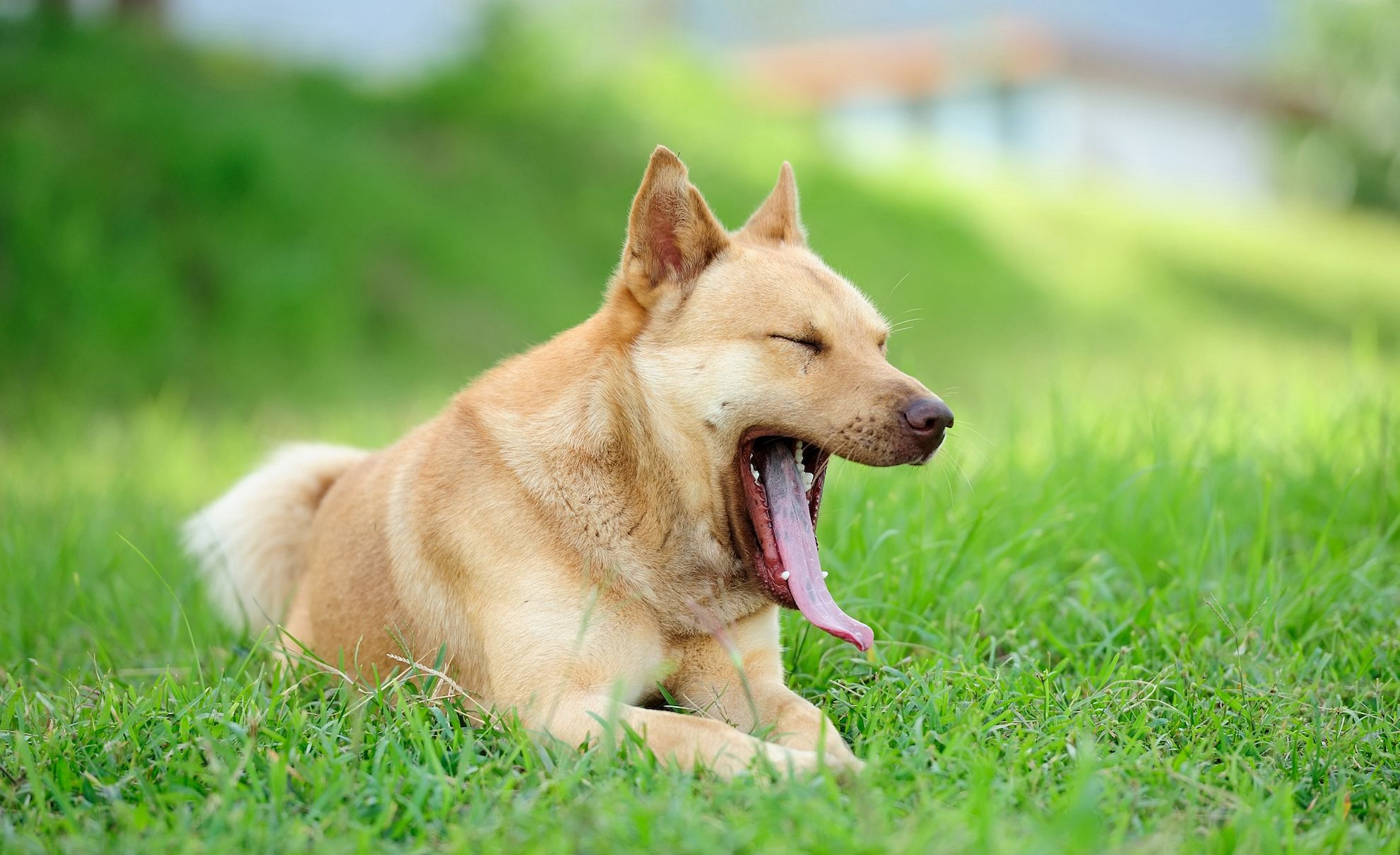When petting a dog, it's not uncommon to notice them yawning. This may leave you wondering why your furry friend is yawning when they're supposed to be enjoying their cuddle session. While it may seem like a simple act, yawning can actually be a complex behavior that can indicate a variety of things.
One possible reason why your dog yawns when you pet them is that they're feeling stressed or anxious. According to Norwegian behaviorist Turid Rugaas, yawning is one of many signals that dogs use to calm themselves down when they're feeling uneasy. So, if your dog is yawning when you pet them, it could be a sign that they're not completely comfortable with the situation.
However, yawning can also be a sign of contentment and relaxation. When dogs are tired or feeling comfortable, they may yawn as a way to release tension and relax. So, if your dog is yawning when you pet them, it could simply be a sign that they're feeling happy and relaxed in your presence. Understanding why your dog is yawning when you pet them can help you better understand their mood and respond accordingly.

Ensure Your Dog's Well-Being with the Fi Dog Collar!
Understanding your dog's yawning behavior is important, but ensuring their overall well-being is crucial. The Fi Dog Collar, paired with its intuitive app, helps you monitor your dog's health by tracking their activity and sleep patterns. Its advanced GPS tracking ensures you never lose sight of your furry friend, especially if they wander off in search of calm during stressful times. With the Fi Dog Collar and its user-friendly app, you can keep an eye on your pet's safety and health, giving you peace of mind and helping you better understand your dog's needs.
Understanding Dog Yawning
If you've ever noticed your dog yawning when you pet him, you may be wondering what it means. According to DoggySaurus and Serve Dogs, yawning in dogs can signify a variety of things.
One possible reason your dog yawns when you pet him is that he's overexcited. This is especially likely if you've been away from him for a while, and he's missed you. He may be so worked up that he can't help but yawn. Alternatively, he may be tired or confused. If he's been playing for a while, he may need a break, and yawning could be his way of telling you he's ready to rest.
Another reason your dog may yawn when you pet him is that he's stressed out. This could be due to a variety of factors, such as being in a new environment, meeting new people or animals, or feeling threatened or scared. In these situations, your dog may yawn as a way of calming himself down.
It's also possible that your dog is simply comfortable and relaxed when you pet him. According to PetMD, yawning is one of many signals dogs use to calm themselves when they are stressed or uneasy. If your dog is yawning when you pet him, it could be a sign that he's feeling safe and secure.
Finally, it's worth noting that yawning in dogs can be contagious. If you yawn, your dog may yawn in response, even if he's not tired or stressed. This is because dogs are social animals and often mirror the behavior of those around them.
Overall, there are many reasons why your dog may yawn when you pet him. While it's not always clear what's causing this behavior, paying attention to your dog's body language and behavior can help you better understand what he's trying to tell you.

Reasons for Dog Yawning
When a dog yawns, it can mean a variety of things. Here are some of the most common reasons why a dog might yawn when you pet them:
Tiredness
Just like humans, dogs can get tired and yawn to show that they need rest. If your dog has been playing or exercising for a while, they may yawn to indicate that they need a break or some sleep.
Communication
Dogs use body language to communicate with humans and other dogs. Yawning can be a way for your dog to tell you something. For example, your dog may yawn to show that they want to be left alone or that they are feeling uncomfortable.
Calming Signal
Yawning can be a calming signal for dogs. If your dog is feeling stressed or anxious, they may yawn to try and calm themselves down. Yawning can also be a way for your dog to communicate with other dogs that they are not a threat and want to avoid a conflict.
Signs of Stress
Yawning can also be a sign that your dog is feeling stressed or anxious. If your dog is in a new environment or is meeting new people or animals, they may yawn to show that they are feeling uncomfortable or unsure.
Discomfort
If your dog is feeling uncomfortable or in pain, they may yawn as a way to cope with the discomfort. For example, if your dog has an injury or is experiencing discomfort, they may yawn to try and distract themselves from the pain.
Pacification
Yawning can also be a way for your dog to pacify themselves or others. If your dog is feeling threatened or scared, they may yawn to try and calm themselves down or to show that they are not a threat to others.

Overall, there are many reasons why a dog might yawn when you pet them. It is important to pay attention to your dog's body language and behavior to understand what they are trying to communicate.
Excessive Yawning in Dogs
While yawning is a natural behavior for dogs, excessive yawning can indicate an underlying issue. Excessive yawning in dogs can be caused by a variety of factors, including anxiety, stress, boredom, and medical conditions.
Anxiety and stress can cause dogs to yawn excessively. Dogs may yawn when they are nervous or anxious, and excessive yawning can be a sign that your dog is feeling stressed. If your dog is yawning excessively and also displaying other signs of anxiety, such as panting, pacing, or hiding, it may be time to consult with a veterinarian or a professional dog trainer.
Boredom is another common cause of excessive yawning in dogs. Dogs may yawn when they are bored or not getting enough exercise or mental stimulation. If your dog is yawning excessively and also appears restless or agitated, it may be time to increase their exercise routine or provide them with more mental stimulation.
Medical conditions can also cause excessive yawning in dogs. Some medical conditions that can cause excessive yawning include liver disease, kidney disease, and neurological disorders. If your dog is yawning excessively and also displaying other symptoms, such as vomiting, diarrhea, or lethargy, it is important to consult with a veterinarian.
In conclusion, excessive yawning in dogs can be caused by a variety of factors, including anxiety, stress, boredom, and medical conditions. If your dog is yawning excessively, it is important to monitor their behavior and consult with a veterinarian if necessary.
Contagious Yawns
Dogs are known for their ability to catch yawns from humans or other dogs. This is called contagious yawning. According to PetMD, contagious yawning is a sign of empathy and social bonding. Dogs are social animals and yawning is a way for them to communicate with their pack members.
When a dog sees another dog or human yawn, it triggers a response in the dog's brain that makes them yawn too. This response is not exclusive to dogs, as humans also tend to yawn when they see someone else yawn. It is believed that contagious yawning is a way for dogs to show empathy towards their pack members.
However, contagious yawning is not always a sign of empathy. It can also be a sign of stress or anxiety. If a dog is in a stressful situation, they may yawn as a way to calm themselves down. This is especially true if the dog is in a new environment or around unfamiliar people or animals.
In conclusion, contagious yawning is a common behavior in dogs and is a sign of empathy and social bonding. However, it can also be a sign of stress or anxiety. If a dog is yawning excessively, it is important to observe their behavior and determine the cause of the yawning.

When to Visit a Veterinarian
If your dog's yawning behavior seems excessive or unusual, it may be time to visit a veterinarian. Excessive yawning may indicate that your dog is stressed or anxious, and a veterinarian can help identify the underlying cause of these emotions.
In addition to excessive yawning, other signs that your dog may be stressed include pacing, excessive panting, trembling, and avoiding eye contact. If your dog is exhibiting any of these behaviors, it is important to seek veterinary care to ensure that your dog's emotional and physical needs are being met.
A veterinarian can also help rule out any underlying medical conditions that may be causing your dog's yawning behavior. For example, if your dog is yawning excessively and also seems lethargic or has a decreased appetite, it may be a sign of an underlying medical condition such as anemia or hypothyroidism.
Overall, if you are concerned about your dog's yawning behavior, it is always best to consult with a veterinarian. A veterinarian can help identify the underlying cause of your dog's behavior and provide guidance on how to best support your dog's emotional and physical well-being."
